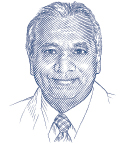Numerous wellness strategies are accessible to busy physicians and oncologists, which can be incorporated into their daily routine. Here we discuss such aspects as stress reduction, mindfulness, eating well, sleeping well, and spirituality for the wellness of oncologists. Those who regularly adhere to these practices describe both personal and job satisfaction. In essence, they are living their best life while delivering high-quality, patient-centered care.

Nathalie D. McKenzie, MD, MSPH

Sarfraz Ahmad, PhD
Stress and Mindfulness
During a typical work week, oncologists experience emotional, intellectual, and physical pressures. If these pressures are suboptimally managed, they can culminate into an inflammatory physiologic cascade and other negative sequelae.
Mental stress, in fact any stress, activates our body to go into “fight-or-flight” mode. The stress hormone (cortisol) is released, which leads to a negative cascade of events, including glucocorticoid receptor resistance. Glucocorticoid receptor resistance leads to a decrease in the sensitivity of immune cells to glucocorticoid hormones (eg, cortisol), which normally terminates the inflammatory response. Constant, unmanaged stress eventually leads to insufficient glucocorticoid regulation, which increases the duration and/or intensity of the inflammatory response. These processes are similar to what occurs with asthma and autoimmune diseases, as well as with the onset and progression of chronic inflammatory diseases such as cardiovascular disease and type 2 diabetes.
Stressors can be balanced through meditation, breathing exercises, mindfulness, and the practice of gratitude. Deep breathing exercises can help activate the relaxation response, thereby decreasing cortisol levels. There are several types of deep breathing exercises, but the goal of all is to focus on breathing, making it slower and deeper.
Mindfulness is a practice that anchors us to the present moment. It helps combat the anxiety-inducing effects of negative thinking. There are several methods of mindfulness-based cognitive therapy, such as mindfulness-based stress reduction, yoga, and meditation. Mindfulness has been shown to increase self-esteem, which in turn lessens the symptoms of anxiety and depression.
Resilience is a multifaceted concept, defined as a dynamic process wherein individuals display positive adaptation, despite experiences of significant adversity or trauma. Emotional resilience is the ability to bounce back after a setback and to thrive, not just survive, in the midst of challenges. Emotional resilience rests upon strong emotional intelligence; to be resilient, you must recognize when you’re becoming emotional, know what you’re feeling, and have strategies to respond to and engage with the emotions. To achieve emotional resilience, we need to be positive, embrace unease, acquire self-compassion, test one’s willpower, experience discomfort, learn from setbacks to gain valuable perspectives, and learn to adapt.
Planning and allotting time daily and during the week for decompressing yields an immense return on investment. Make time for yourself and for your loved ones, and recharge. Physical attributes can, at times, give clues to our state of health. Our body’s physical appearance is not always necessarily indicative of good health—it’s what’s inside our body that matters most. Take, for example, the function of mitochondria in our cells. Our body’s ability to combat oxidative stress relies heavily on the optimal function of the organism as a whole.
“Emotional resilience is the ability to bounce back after a setback and to thrive, not just survive, in the midst of challenges.”— Nathalie D. McKenzie, MD, MSPH, and Sarfraz Ahmad, PhD
Tweet this quote
Diet and Weight
A plant-based, whole-food dietary strategy provides sufficient antioxidants, phytonutrients, and coenzymes for proper homeostasis and allows us to address oxidative stress, free radicals, and mitochondrial damage. Oxidative stress breaks down our cells and affects our tissues and organs, thereby causing premature aging and diseases. Consuming nutrient-dense unprocessed foods equips our bodies with the substrates necessary for optimal function. This balancing strategy significantly improves mitochondrial function and reduces the risk of diseases (including overweight, obesity, degenerative disorders, and cancer) and eventually modifies or prolongs the aging process.
A majority of the U.S. adult population is overweight or obese, which governs tremendous medical complications, particularly toward cancer and cardiovascular disorders. Obesity is reportedly associated with most common types of cancers such as uterine, esophageal, breast, prostate, kidney, thyroid, gallbladder, colorectal, and pancreatic. Excess amounts of estrogen (through peripheral conversion in obese patients), in combination with low chronic inflammation, increase the risk of breast, endometrial, and other cancers.
Several oncogenic pathways are at play in obesity, including increased levels of insulin and insulin-like growth factor 1 in the blood, promoting the development of certain tumors. Adipokines, such as leptin, promote cell proliferation. Direct and indirect effects on other tumor growth regulators, including the mammalian targets of rapamycin and AMP-activated protein kinases, are upregulated in obesity, which itself leads to chronic low-level, or “subacute,” inflammation, thereby increasing the risk of malignancy. Balancing the “cortisol cascade” with anti-inflammatory substances is crucial, which leads to decreased cortisol levels and increased well-being.
Managing weight, decreasing the intake of processed and sugary food and beverages, and increasing micronutrients help reduce the risk of chronic disease and strengthen the immune system. This can be achieved by maximizing the intake of whole-plant food, fiber, antioxidants, phytonutrients, and essential fatty acids (eg, vegetables, fruits, whole-intact grains, nuts, seeds, beans, and omega-3 fatty acids). Interestingly, what we eat also has a direct effect on our emotions (gut-brain connection).
Exercise and Sleep
Maintaining good and regular physical condition through moderate or vigorous activities is essential to wellness by managing cortisol levels and building resilience. Activities such as yoga (or cardio-stretching), moderate-intensity walking, running, team or individual sports, when performed regularly and of sufficient intensity, have been shown to significantly reduce the likelihood of several chronic diseases and mood disorders, as well as to improve quality of sleep and overall sense of wellness.
Adequate sleep is no less important—sleep deprivation results in profound impairments in cognitive and behavioral performance. The benefit of good sleep in cognition is adequate neural processing (eg, insight formation, novel language perception, visual discrimination, and motor skills). Although the quantity may vary by individuals depending on age and surrounding environmental conditions, adequate sleep helps with cognitive processes such as insight formation, memory consolidation, and behavioral performance.
“We must care for ourselves with the same resolve, compassion, and dedication that we do for our patients and their caregivers.”— Nathalie D. McKenzie, MD, MSPH, and Sarfraz Ahmad, PhD
Tweet this quote
Spirituality
Spiritual practices, which certainly vary in definition by individual depending on ethnicity and sociocultural background, potentially improve coping skills and social support. Spirituality fosters feelings of optimism, greater satisfaction, inner peace, joy, enlightenment, awakening, compassion, altruism, forgiveness, karma, hope; it also promotes healthy behavior (such as the avoidance of tobacco and alcohol) and reduces feelings of depression and anxiety. The manifestation of spirituality in an individual’s life promotes the belief in a power operating in the universe that is greater than oneself and strengthens an awareness of the purpose and meaning of our life. Ultimately, spiritual practices of numerous types ameliorate stress responses involving neurologic, endocrine, immune, and cardiovascular functions.
Social connectedness was one of the common denominators explored in the blue zones (regions of the world where some consider people live longer than people in other places), as well as other groups of people who appear to exhibit longevity and decreased risk of chronic diseases. The explanation for this is likely multifactorial; nevertheless, social connectedness and a sense of community balance stress, have a positive effect on mood, and may be linked to longevity.
While crucial to physicians’ overall health, incorporating all of these strategies may appear to be daunting. The busy and stressed oncologist may find difficulty in developing a wellness plan that is both feasible and sustainable. Although the possibilities are enumerable, we suggest an example below:
Going to work daily with at least healthy snacks, or preferably prepared meals, allows for better control over macro-/micronutrient intake. (Having healthy options available when hungry makes for better choices.)
Do deep breathing and meditation for 5 minutes upon waking, followed by 15 minutes of high-intensity interval training, before showering and starting the day.
In the afternoon or evening, do 15 minutes of meditation/gratitude prior to beginning “home time.” Whether home alone or with family/pets, this allows us to leave work behind and enter our home in a more peaceful state.
Although sleep requirements vary, a goal of 7 to 8 hours of quality sleep appears sufficient for repair and homeostasis.
Conclusion
Physician burnout is a growing concern. A demanding oncology career within our ever-changing health-care system contributes significantly to this problem. Physicians must be willing to take care of their own health and well-being with the same resolve, compassion, and dedication that they do for their patients and caregivers.
DISCLOSURE: Dr. McKenzie has served in a consulting or advisory role for AstraZeneca; has been paid to participate in a speakers bureau for Clovis Oncology; and has been reimbursed for travel, accommodations, or other expenses by Clovis Oncology. Dr. Ahmad reported no conflicts of interest.
Dr. McKenzie is triple board-certified in obstetrics & gynecology, gynecologic oncology, and lifestyle medicine. She sits on the SGO Wellness Task Force as well as ASCO’s Clinical Practice Guidelines Committee. A 15-year cancer survivor, Dr. McKenzie is passionate about cancer survivorship and physician wellness and regularly lectures on these topics. Dr. Ahmad is Director of Clinical Research at the Gynecologic Oncology Program of AdventHealth Cancer Institute and Professor at the University of Central Florida and Florida State University, Colleges of Medicine, Orlando. He has published nearly 200 peer-reviewed research articles/book chapters and almost 400 abstracts in clinical and translational oncology/hematology.
Disclaimer: This commentary represents the views of the author and may not necessarily reflect the views of ASCO or The ASCO Post.

